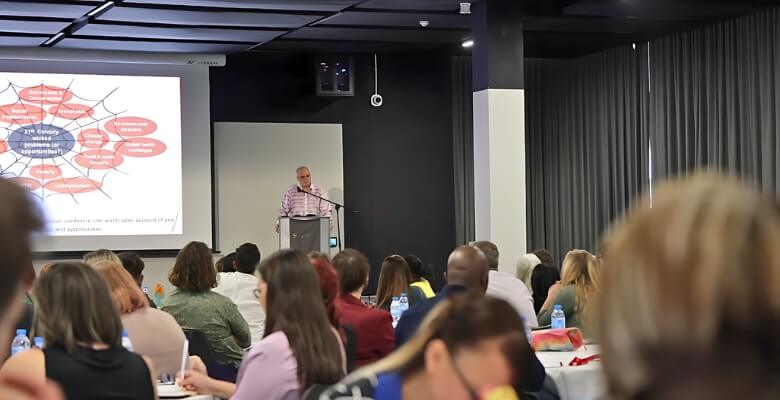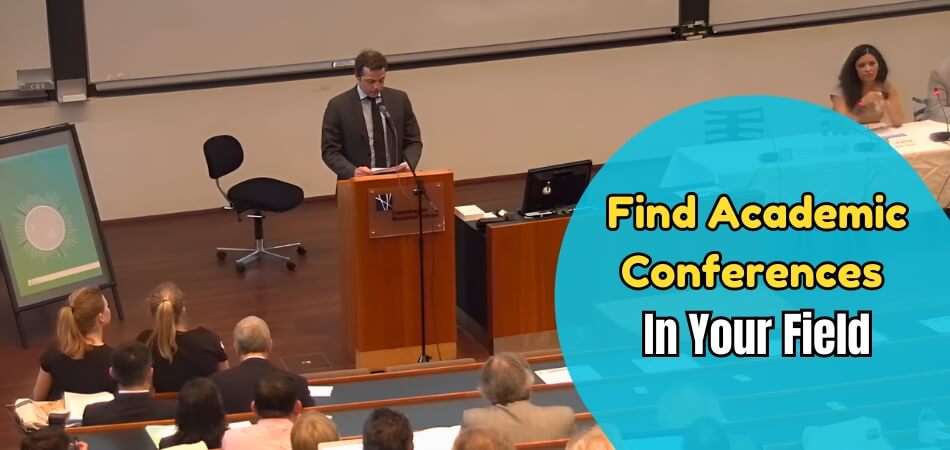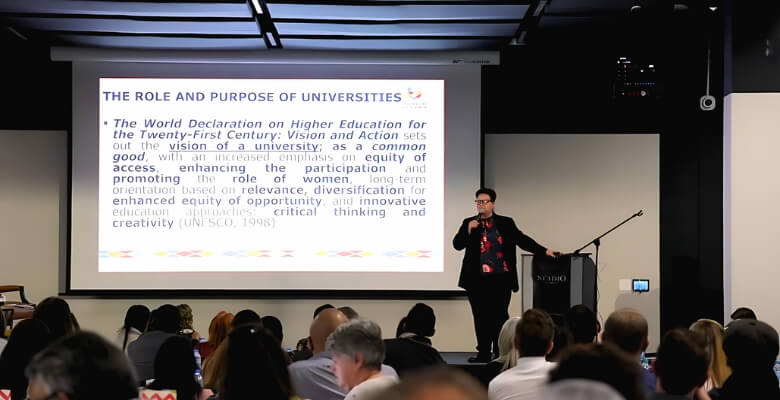Academic conferences play a vital role in professional growth, offering a space for researchers and experts to share insights and discoveries. These events not only provide a platform to showcase work but also open doors to networking, collaboration, and industry trends.
For professionals and students alike, attending conferences can be a valuable investment in their field. However, you might be wondering “How do I find academic conferences in my field?”
A great starting point is to explore academic journals, as they often list upcoming conferences related to your area of study. University websites and professional organizations like Global Conference also frequently post relevant conference announcements.
Additionally, speaking with colleagues and mentors can lead to excellent recommendations. For more detailed tips on finding and selecting the best conferences, follow along in the rest of the article!
The Core Purpose of Academic Conference
Academic conferences are vital for scholars seeking to advance their research and connect with other experts. These gatherings allow researchers to present new findings, receive feedback, and refine their ideas. For instance, someone looking for upcoming academic conferences in Canada might seek events specifically relevant to their field. Conferences also offer a platform for learning about the latest developments and methodologies that could impact their work.

The primary purpose of these meetings is to create an environment of learning and collaboration among academics from various disciplines. By attending, participants can engage in discussions that challenge and broaden their perspectives.
Networking with peers provides opportunities to collaborate on future projects or find mentors. As a whole, academic conferences serve as crucial hubs for exchanging knowledge and advancing collective understanding.
Why are Academic Conferences Important?
Academic conferences play a crucial role in researchers’ professional and academic development. They offer numerous benefits, from knowledge sharing to networking. Get ready for the academic conference to maximize these opportunities. Here, we explore why academic conferences are important.
Knowledge Exchange
Academic conferences facilitate the exchange of knowledge. Researchers present their latest findings to peers. Attendees learn about new studies and methodologies. This exchange helps keep everyone updated on the latest advancements.
Networking Opportunities
Conferences provide excellent networking opportunities. Attendees can meet professionals, researchers, and students from various fields. These connections can lead to collaborations, mentorships, and new friendships. Building a strong network is crucial for career growth.
Professional Development

Presentation Skills
Presenting at conferences improves public speaking skills. Researchers receive feedback on their work. This helps them refine their presentation techniques. Gaining confidence in public speaking is an essential skill for academic and professional success.
Access to Innovative Research
Conferences offer access to the latest research. Attendees can learn about new findings and innovative approaches. This knowledge can inspire new ideas and improve their work. Staying updated is vital for professional development.
Collaborative Environment
Conferences foster a collaborative environment. They encourage the exchange of ideas and promote teamwork. Attendees can work with others on joint projects or research. Collaboration is key to innovation and problem-solving.
Enhancing Academic Profile
Participating in conferences enhances one’s academic profile. Presenting research demonstrates a commitment to contributing to the field. It also increases visibility among peers and experts. This recognition can lead to future opportunities.
How Do I Find Academic Conferences in My Field?
Your research can be elevated and valuable networking opportunities can be gained by attending the right academic conferences. Attending relevant conferences keeps you informed about the latest trends and helps you connect with peers and mentors. Here’s a practical, step-by-step guide to help you discover academic conferences that align with your field.
Step 1: Search Academic Journals
Explore journals related to your research area, as they frequently list calls for papers and conference details. Staying updated with these journals helps you learn about upcoming conferences early. Many journals feature dedicated sections for conference announcements. Regularly browsing them keeps you aware of valuable events.
Step 2: Visit University Websites
University websites, especially those of prominent institutions, often promote upcoming academic events and conferences. Checking their news sections and event pages can reveal various gatherings in your field. These sites are especially useful for spotting nearby conferences. Universities regularly host academic conferences open to a broad audience.
Step 3: Explore Professional Organization Sites
Professional organizations, like Global Conference, offer detailed listings of upcoming events and submission requirements. These sites provide ways to find out about conferences specific to your academic interests. By browsing their pages, you can learn about event themes and locations. Regular visits to these sites help you stay informed.
Step 4: Utilize Online Databases
Use the official website of global conferences to find the conferences that match your study or field. This website allows you to filter searches by topic, date, and location. Online databases simplify the process of finding conferences that adjust to your needs. They’re especially helpful for locating specialized or international events.
Step 5: Join Professional Networks
Participate in professional networks and forums where members often share relevant conference details. Engaging with these communities keeps you updated on timely and field-specific gatherings. Many members post announcements about conferences they’re attending or organizing. These networks also foster relationships with potential collaborators and mentors.
Step 6: Subscribe to Newsletters
Sign up for newsletters from professional organizations and universities to receive direct conference updates. These newsletters often announce conferences relevant to your field and offer additional event insights. Regular updates sent to your inbox save time and keep you informed. Subscribing ensures you won’t miss important deadlines.
Step 7: Attend Previous Conferences
Keep in touch with organizers from past conferences to stay informed about future events. By joining their mailing lists, you may receive exclusive announcements about upcoming gatherings. Organizers often provide inside information and useful contacts for future networking. This connection keeps you in the loop for related conferences.
Step 8: Follow Social Media Channels
Connect with universities, professional organizations, and conference organizers on platforms like Twitter and LinkedIn. Social media channels are quick sources of updates on conference schedules, themes, and locations. Conference news and discussions frequently appear on these platforms. Staying active on social media helps you catch opportunities as they arise.
What to Consider in Choosing the Right Conference?
It is important to choose the right conference if you want to maximize the benefits of academic conferences. Several factors should be considered to ensure the conference aligns with your professional and academic goals. Here are key aspects to consider when selecting the right conference.
Relevance to Your Field
Ensure the conference topics align with your research interests. Review the conference’s agenda and past programs. This helps gauge the relevance of the event. Attending a relevant conference maximizes learning and networking opportunities.
Reputation and Credibility
Check the conference’s reputation within the academic community. Look for reviews and feedback from previous attendees. A well-regarded conference often attracts leading experts. This enhances the quality of presentations and discussions.
Location and Accessibility
Consider the conference location and its accessibility. Evaluate travel costs and logistics to ensure they fit your budget. A conveniently located conference reduces travel stress. It also allows more focus on the event’s content.
Costs and Budget
Review the conference fees, including registration, travel, and accommodation. Ensure the total costs fit within your budget. Consider any available funding or grants. Budgeting effectively prevents financial strain and allows a stress-free experience.
How to Make the Most Out of an Academic Conference Participation Experience?
The benefits of attending an academic conference include advancing your knowledge and growing professionally. By actively participating and preparing well, you can gain valuable insights and connections. Here are some tips to help you make the most of your conference experience.
- Plan Ahead: Research the conference schedule to select sessions aligning with your goals and interests. Finding a conference with relevant topics ensures a productive experience. A well-thought-out plan keeps you focused and maximizes learning. Thoughtful preparation helps you make the most of every session and opportunity.
- Network Actively: Engage with people from diverse fields, as networking offers unique perspectives. Introduce yourself, exchange contacts, and follow up with new connections.
- Participate in Discussions: Ask thoughtful questions during sessions to show your interest and encourage conversation. Engaging in discussions often leads to valuable post-session insights.
- Take Notes: Write down key points from each session, as this helps retain critical information. Notes become useful references after the event ends.
- Share Your Experience: Share takeaways through social media or blog posts, which reinforce your learning. Discussing insights with others expands your knowledge and perspective.
- Seek Mentorship: Look for potential mentors or experienced professionals in your field, and don’t hesitate to ask for advice. Mentorship can provide guidance beyond the conference.
- Reflect and Apply: After the event, take time to reflect on how you’ll apply what you learned. This reflection ensures you convert insights into real-life action.
FAQs for How Do I Find Academic Conferences in My Field?
Finding academic conferences in your field can greatly benefit your professional journey, offering platforms for networking and knowledge sharing. Here are some commonly asked questions to guide you in identifying and selecting the best conferences for your area of research.
How Can I Stay Updated on Annual Conferences?
Subscribing to academic newsletters and professional organizations’ mailing lists is an effective way to stay informed. Many conferences happen annually, and organizations share event information through emails, keeping you updated on relevant gatherings each year.
Are Social Media Platforms Useful for Finding Conferences?
Yes, platforms like LinkedIn and Twitter are valuable tools for discovering upcoming conferences. Many organizers and academic institutions post event details, registration deadlines, and relevant updates, making social media an accessible source for conference information in real time.
Can Academic Advisors Help in Finding Conferences?
Academic advisors and mentors often have insights into relevant conferences in your field. They can recommend events they’ve attended or ones aligned with your research, providing you with targeted options and sharing experiences to help guide your decision.
How Early Should I Start Searching for Conferences?
It’s advisable to start searching for conferences several months in advance to meet submission deadlines. Planning ahead gives you time to review themes, prepare materials, and even secure funding if needed for travel or registration.
Can Attending Local Conferences Help in Finding International Ones?
Yes, local conferences can be a great starting point for learning about global events. Many international conference organizers or participants attend local events, providing opportunities to network and gather information about larger, field-specific conferences worldwide.
Final Thought
Professional growth and networking opportunities can be enhanced by attending the right academic conference. Conferences facilitate knowledge exchange, professional development, and innovation. Attending these events can maximize your benefits by considering factors like relevance, reputation, location, and costs.
In answer to the question, “How Do I Find Academic Conferences in My Field?” utilize resources like academic journals, university websites, and professional organization sites like Global Conference. Colleagues and mentors can also provide valuable recommendations. Stay informed about the most relevant and impactful conferences.
Conferences can greatly benefit your career and academic journey. You can present your research, receive constructive feedback, and make valuable connections. Using the outlined steps, you can identify and choose conferences that align with your professional goals, ensuring a rewarding experience.






